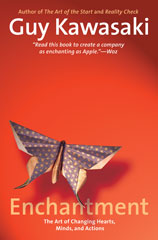Guy Kawasaki . . . Genius in Action,
By Sam Horn, The Intrigue Expert
“It’s not enough to be the best at what you do; you must be perceived to be the only one who does what you do.” – Jerry Garcia of the Grateful Dead
I’m always keeping my antenna up for people who are one-of-a-kind at what they do.
I had the privilege of seeing one in action last week.
As The Intrigue Expert and a communication strategist for the past 25 years; I’ve seen and given thousands of presentations. (Really).
So, when I say Guy Kawasaki’s keynote at the Invent Your Future conference in Silicon Valley was one of the best presentations I’ve ever experienced, that’s saying something.
I was compelled to take notes because it’s a privilege to watch a master in action.
I shared my observations with Guy afterwards and am sharing them here so you can learn from his shining example and adopt/adapt some of his approaches so you can enchant (and intrigue) your future audiences.
Here’s why Guy’s keynote Enchantment: The Art of Changing Hearts, Minds and Action was a perfect 10.

Everyone was drawn in (and enchanted)
Please note: I’ve distilled this debrief of his brilliant presentations into three blog posts. Check back the next couple days to read and reap additional techniques.
1. Guy had us at hello.
“You’ve got to be a good date for the reader.” – Kurt Vonnegut
No perfunctory opening remarks. That would have been predictable and predictable is boring.
Guy pleasantly surprised everyone by starting with an amusing riff about how most speakers run long and no one’s ever angry at a speaker for ending early so he was going to jump right into things.
Guy knows people are BBB – (Busy, Bored or Been there-heard that) and that we make up our minds in the first 60 seconds whether someone is worth our valuable time, mind and dime.
He earned our good will in the first few minutes by being a “good date” and by kicking off with humor vs. the old-fashioned “Tell ‘em what you’re going to tell ‘em approach ” which would have had us reaching for our smart phones.
Bestselling author Elmore Leonard gave a keynote at the Maui Writers Conference (which I emceed for 17 years.) During the Q & A, a participant asked, “Why are your books so popular?” “Dutch” smiled and said, “I try to leave out the parts people skip.”
Guy was instantly popular because he left out the parts people skip.
2. Guy engaged our head and heart – our left and right brain – with facts and feelings.
“I never developed a plan for where I was going. I just counted on one interesting job segueing into the next. I let the universe do its work.” – Bernadette Peters
Any extreme is unhealthy. Many speakers (think engineers, IT professionals, physicians, professors, etc.) focus primarily on data, theories and facts. This makes for a lopsided speech because it’s long on logic but short on interest.
Other presenters (think motivational speakers) share inspiring stories but there’s no “meat” – no tangible takeaways we can apply to reap real-world results.
Guy was a sublime balance of head and heart. He let us know from the get-go he’d distilled his presentation into ten insights and 45 minutes.
People love top ten lists because it indicates you’ve done the homework for us and edited the superfluous, which means we’ll be hearing only the most salient points, the best of the best.
Anxiety is defined in two words: “not knowing.” If we don’t know how long this is going to take or the format, we may resent the speaker because, in a way, they’re keeping us in the dark and holding us hostage.
Covering 10 points (or 7 steps or 6 keys or whatever) in a specified amount of time builds pace and momentum and keeps a speaker on track because you don’t have time to ramble. Logical left-brainers think “Oh, good. This is clearly going to be bottom-line and a good use of my time because it’s measurable and replicable.”
Furthermore, a 10 point plan provides one of the quickest organizational constructs known to humankind because it provides an easy-to-understand-and-follow pattern. Listeners feel they’re in “the Allstate Plan” (they’re in good hands) and feel well-led as one interesting point segues into the next.
Better yet, Guy balanced rhetoric (words) with photos (senses) throughout his presentation. Everyone was drawn in (and enchanted) because he “peopled his points.” His beautifully produced slides featured intellectually satisfying ideas, visually stunning images and named individuals which produced a holistic sense of symmetry. Well done!
3. Guy condensed his concepts into one-of-a-kind sound bites.
“ Remember, you’re more interested in what you have to say than anyone else.” – Andy Rooney, 60 Minutes
“Invoke reciprocity”.
“Conduct a ‘Premortum.”
“Incur a Debt.”
“Frame Thy Competition.”
“Separate the Believers.”
These are just a few of Guy’s featured sound-bites (and chapter titles).
How could you NOT want to know more?
Guy got his ideas in our mental front door because he was not content to be common.
Instead of lazily sharing platitudes and clichés (“Make it a win-win. It’s all about team.”), he coined first-of-their-kind phrases that got our eyebrows up.
(Side note: What’s The Eyebrow Test? It is a technique described in my book POP! that gives you a way to test how compelling your communication is . . anywhere, anytime . . . in 5 seconds . . . for free.

The goal is to get their eyebrows UP
You don’t have to convene a focus group and spend thousands of dollars to determine whether your idea is commercially-viable.
Simply tell someone your main point (or your elevator speech, business name, book title, the first 60 seconds of your pitch/presentation, or the first paragraph of your marketing copy) . . . and watch their eyebrows.
If their eyebrows knit or furrow, it means they’re confused. They didn’t get it. And if they didn’t get it, you won’t get it.
The goal is to get their eyebrows UP.
Try it right now. Lift your eyebrows. Do you feel intrigued? Curious? Like you want to know more?
THAT’s your goal as a communicator – to get the eyebrows up of busy, distracted decision-makers because it means you just got your message in their mental door.)
Guy’s succinct sound-bites made his content POP! Because no matter how many books we’ve read or seminars we’ve attended, we’d never heard this before.
Comedian Jonathan Winters said, “I have a photographic memory. I just haven’t developed it yet. By developing original take-aways and NURDS (new words like Premortum), Guy made his content memorable and sticky.
Unique sound-bites give his content a long tail of influence. People love “the next new thing” and are more likely to share freshly-phrased ideas around the water-cooler – which means they’ll become Guy’s tribe and take his work viral by becoming his voluntary word-of-mouth ambassadors.
Phrases like “invoke reciprocity” are also monetizable and merchandisable.
People will pay for refrigerator magnets (or coffee mugs or t-shirts) with catchy phrases like this. This keeps you and your proprietary ideas “in sight-in-mind” with your target customers which gives your material even longer legs. It’s all good.
Check the next blog to discover more ways Guy demonstrated
platform brilliance.



